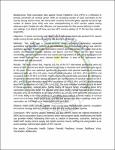| dc.description.abstract | Background: High vaccination rates against Human Papilloma Virus (HPV) is a milestone in
primary prevention of cervical cancer. With an increasing number of cases and deaths in the
country among women hover, like many other countries around the globe, Uganda has had a high
number of district (over 90%) who were underperforming in HPV vaccine uptake among
adolescent girls. Despite the safe, effective, and opportunities for free vaccine delivery in health –
care settings, Lira district still have very low HPV vaccine uptakes of 17.4% less than national
target 80%.
Objective: To assess community and health system factors associated with parental PHV vaccine
uptake among female adolescent age (9 to 15) years in Lira district.
Methods: This study was a crossed-sectional design employing explanatory sequential
quantitative and qualitative methods of data collection. The phenomenology design was used for
qualitative approach. Additionally, quantitative research generates factual information that can be
readily communicated through statistics and figures and from which one can draw factual
conclusions. Structured questionnaire was used to parent/guardians of girls age (9 to 15) years and
some health workers from some selected health facilities. A total of 577 participants were
interviewed and data processed.
Results: The study shown that, majority (61.2%) of the 577 interviewed participants were not
aware of HPV vaccine and 38.8% reported being ready to vaccinate their adolescent girls age (9
to 15) years. There was statistical significance association with parental readiness to vaccinate
adolescent girls age (9 to 15) years: level of formal education (x2=55.4, df=3, p<0.001); and
occupation (x2=6.76 df=2, p=0.034). Community factors significantly associated the willingness
of parents to immunize their teenage daughters are: family history of cervical cancer (x2=18.5,
df=1, p<0.001); get information about HPV vaccination (x2=470.6, df=1, p<0.001) and knowledge
about HPV vaccination (x2=184.1, df=2, p<0.001). The study considers variables such as the level
of formal education, material status, family history of cervical cancer, knowledge about HPV
vaccination, and income level. The adjusted odds ratios (AOR) indicate that parents with tertiary
education are 2.25 times likely to be ready (AOR=2.25, p=0.01) while unmarried individuals are
0.47 times likely to be ready (AOR=0.47, p=0.009), those without a family history of cervical
cancer are 0.36 times likely (AOR=0.36, p<0.001 and parents with poor knowledge about HPV
vaccination are 0.05 likely to be ready (AOR=0.05, p<0.001).
Distance, health staffs’ attitude, parents’ level of education, misconception, parents, occupation
and vaccine shortage were the common barriers of HPV vaccine uptakes reported.
Conclusion: HPV vaccine uptakes readiness was low (38.8%) below the national threshold of
(80%) due to association factors and barriers which were program based, beneficiaries and health
care provider related. Addressing them such as creation of awareness, outreaches, trainings to
health staff, steady vaccine supply and mobile survives revival, staffing and using leaders as an
access strategy shall increase uptake of HPV vaccine
Key words: Community, Health, System, Parental, Readiness, Human, Papilloma, Virus,
Vaccination, Adolescents . | en_US |

